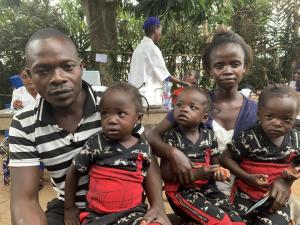Parents rush for measles vaccine after recent outbreak kills thousands of children in the Democratic Republic of the Congo
Hypolite Mandala and his wife, Nadège, were among the first parents to arrive for the measles vaccination at Nzombi Health Centre in Masi Manimba, a village 400 km south of Kinshasa.
They brought their 3-year-old triplet girls. The children had missed out on being vaccinated for measles at the designated age of 6 months and are in serious danger of infection.
The triplets, dressed in black-spotted dresses, patiently sat on a bench, each taking their turn for the vaccine as their parents held them.
Hippolyte and his wife are among the hundreds of thousands of parents across the Democratic Republic of the Congo who rushed to have their children vaccinated following the launch of a measles campaign by the Government, the World Health Organization (WHO) and partners.
“I am happy to have had the girls immunized because having sick children makes everything difficult for the family,” their father says. “Whenever one of the girls is unwell, the others become very uneasy and difficult to handle.”
A few streets from the health centre, community mobilizer Mundumusi Lipsa bellows through his megaphone, calling on parents to take children who are not vaccinated to the health centres offering the vaccination. His colleague, Lula Pwati, and a WHO epidemiologist are going from house to house to make sure no child is left behind.
According to preliminary reporting on coverage, the nine-day vaccination campaign that reached the triplets of Hippolyte and Nadège most likely will go beyond the targeted 825 000 children in what has become the world’s largest and fastest-moving outbreak. To date, the number of suspected cases has gone beyond 203 000 (6276 confirmed), with more than 4000 deaths, nearly all of them children. This vaccination campaign is the third emergency intervention targeting children aged 6–59 months.
“Measles is a disease that not only kills but also has very serious complications. Health workers must always remind parents to take the children for the shot on time,” says Dr Helene Chenge, a WHO epidemiologist.
The campaign is funded by the United Nations Humanitarian Pooled Fund, with contributions from the WHO Contingency Fund for Emergencies and from the Measles and Rubella Initiative.
A five-day follow-up immunization campaign in seven provinces is slated to begin on 22 October to provide supplemental doses to children aged 9–59 months and thus reach those who were not vaccinated through the routine immunization programme.
Communications Officer
WHO DRC
Tel : +243 81 715 1697
Office : +47 241 39 027
Email: kabambie [at] who.int (kabambie[at]who[dot]int)
Communications Officer, WHO Kenya
Mobile: +254 791 197454
Email: kisimirj [at] who.int (kisimirj[at]who[dot]int)
Communications and marketing officer
Tel: + 242 06 520 65 65 (WhatsApp)
Email: boakyeagyemangc [at] who.int (boakyeagyemangc[at]who[dot]int)



